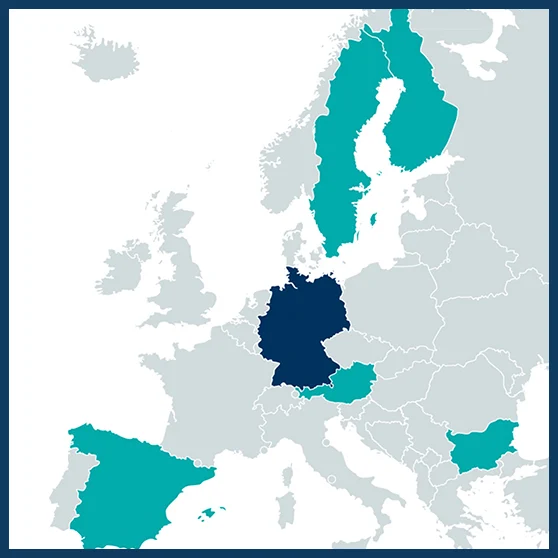01/03/2022 – 31/03/2025
€ 1,246,023
Metodi SOTIROV
metodi.sotirov@ifp.uni-freiburg.de
Coordinator: Forest and Environmental Policies, University of Freiburg, Freiburg, Germany
Ecosystems Services and Management, International Institute for Applied Systems Analysis, Laxenburg, Austria
Business Management, University of Forestry Sofia, Sofia, Bulgaria
Bioeconomy, European Forest Institute Joensuu, Joensuu, Finland
Resilience, European Forest Institute Bonn, Bonn, Germany
Bioeconomy and Governance & Landscape dynamics and biodiversity, Forest Sciences and Technology Centre of Catalonia, Solsona, Spain
Business Administration, Technology and Social Sciences, Luleå University of Technology, Luleå, Sweden
Forest Resource Management, Swedish University of Agricultural Sciences, Umeå, Sweden

Despite ambitious global and EU policy targets, biodiversity is under increasing threat. Biodiversity decline and degradation of ecosystems continue at an alarming rate, especially in forests that harbour 80 percent of terrestrial biodiversity worldwide. Only 0,7 percent of forests in Europe are in a primary condition; many primary and old growth forests lack effective protection and the majority of forest habitat and species in protected (Natura 2000) as well as managed forests are in a non-favourable conservation status. Enhanced conservation and restoration of forest habitats, species and functions are essential for biodiversity and provision of ecosystem services. Ambitious policy targets are important, but they are not enough to reverse the biodiversity crisis. While strong positive and negative interdependencies exist between biodiversity, forestry, climate change and water management, effective biodiversity goal achievement presupposes cross-sectoral policy coherence and implementation across EU, national and local levels. Effective implementation also depends on supportive behavioural responses by forest owners and conservation managers who have to respond to multiple policy and socio-economic drivers forcing them to make trade-offs under complexity, uncertainty and climate change. Previous research suggests that cross-sectoral goal conflicts and failures to understand behavioural responses constitute major barriers to achieving desired forest biodiversity outcomes.
To address the knowledge gaps and inform decision-making to address the problems mentioned above, BIOCONSENT will implement innovative inter- and transdisciplinary activities. Five main activities will be implemented:
- Mapping policy targets and instruments as well as assessing the cross-sectoral policy integration and actor coordination at the biodiversity-forestry-climate-water nexus
- Exploring forest owners’ and conservation managers’ behavior and behavioral changes under different scenarios required for positive transformation towards sustainable socio-ecological systems with improved forest biodiversity status
- Integrating biophysical, social, economic and policy drivers shaping forest conservation in modelling tools and restoration as well as quantifying and assessing the outcomes of alternative conservation and restoration measures on forest biodiversity and ecosystem service provision across spatial and temporal scales
- Upscaling and disseminating project findings as well as co-designing policy and management recommendations for decision making support
- Communicating and disseminating the results of BIOCONSENT.
BIOCONSENT addresses knowledge gaps and policy needs by developing novel integrative socio-ecological approaches and tools, and by applying and disseminating these approaches and tools in participatory research activities with practitioners and workshops for policymakers and stakeholders, including public and private forest owners and managers, environmental NGOs, scientists, consultants and concerned citizens initiatives. BIOCONSENT will define and quantify forest biodiversity conservation and restoration outcomes to understand benefits and risks associated with alternative policy and management trajectories, and to assess which restoration policies, practices and management actions are effective under what conditions.
Through its novel approach, BIOCONSENT aims at developing outcomes of particular added value and its impact, notably by developing:
- an integrated socio-ecological system approach addressing the forest-biodiversity-climate-water nexus (state of the art scientific and popular publications);
- innovative ways to explore pathways of change through linking policy/governance and actors’ behavioural change (innovative participatory methods);
- novel techniques to integrate human behaviour in forest models to bridge across spatial scales (from stand to EU level, new simulation models); and
- enhanced decision support tools enabling decision makers in policy and practice at different geographical scales to make informed choices, explore synergies, and balance trade-offs (scientific papers, practitioners’ publications; new maps, tablet software).
BIOCONSENT will inform the European Green Deal, the new EU Biodiversity Strategy to 2030, the new EU Forest Strategy to 2030, the EU Habitats Directive and the EU Water Framework Directive, and related forest biodiversity conservation and restoration policies at the national and regional level in Europe.
An inter- and transdisciplinary approach will ensure participation from concerned parties and organisations across EU and (sub-)national decision-makers in policy and practice that can help maintain and restore forest biodiversity while reducing climate change, improving water quality and safeguarding a sustainable and multifunctional use of forests.
The policy analysis, scenario development, behavioural experiments and modelling will be carried out in six case studies. This includes five regional case studies in four European countries (Bulgaria, Germany, Spain, and Sweden) and a cross-country case study at the EU-27 level. The case studies are selected to reflect the variety of EU bio-geographical regions (e.g., Boreal, Continental, Mediterranean), policy and governance systems (unitary/federal states) and socio-economic (richer/poorer EU countries) contexts. Upscaling of the results be achieved through cross-comparison and active science-policy-practice interface across the (sub-) national and EU-27 level case studies.
- Austrian Science Fund (FWF), Austria
- Bulgarian National Science Fund (BNSF), Bulgaria
- Academy of Finland (AKA), Finland
- VDI/VDE-IT, Germany
- Agencia Estatal de Investigación (AEI), Spain
- The Swedish Environmental Protection Agency (SEPA), Sweden